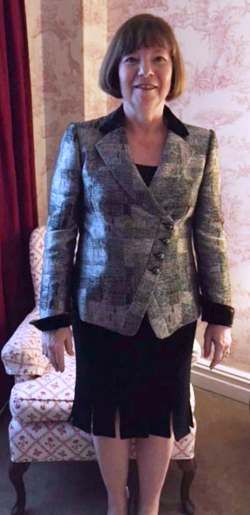
For more than a decade, students in Queen’s Public International Law program at Herstmonceux Castle have learned about the legalities of global crimes from expert Kimberly Prost. Now she’ll be tackling genocide, crimes against humanity and war crimes as a judge of the International Criminal Court (ICC), a court of last resort. Prost, a former judge of the International Criminal Tribunal for the Former Yugoslavia (ICTY), says, “I’m happy to return to the bench of an international court and will also enjoy contributing to the development of this still young institution.”
In order to be eligible for the judgeship, Prost first had to be nominated by the Canadian federal government. “I was very honoured to be nominated,” she says, “I am sure the field was a rich one so it meant a lot to be selected.”
After her nomination, Prost faced a gruelling election that culminated in six-rounds of voting by secret ballot. “The election process was very stressful and challenging, though there were lots of interesting moments.” She described having to promote her candidacy during meetings with more than 100 State-Party representatives from all over the world and undergoing an intensive interview by the advisory Committee of the Assembly of State Parties. “I am very grateful to my amazing team from the Canadian Foreign Affairs in New York, The Hague and Ottawa,” she says.
Prost was one of six judges elected from among 12 candidates and will serve a nine-year term. She joins an 18-judge court that sits in The Hague and hears cases involving the gravest crimes of concern to the international community: genocide, crimes against humanity, war crimes and the crime of aggression.
“I am passionate about international criminal justice and have worked in that field for most of my career,” she says. “I am looking forward to using the experience and skills I have gained over the years in support of an institution I feel strong about.”
The ICC began operating in 2002 when its founding document – a multilateral treaty called the Rome Statute – was ratified by 60 nations. Among the dozens of individuals who have been indicted by the ICC are Ugandan rebel leader Joseph Kony, Sudanese President Omar al-Bashir, and Ivorian former president Laurent Gbagbo.
Interestingly, while serving as the Director of the International Assistance Group (IAG) at the Department of Justice in the mid-’90s, Prost participated in the negotiation of the Rome Statute. Further, she served as the Chef de Cabinet to the President of the ICC before her election to her current position. She notes that these experiences provide a “deeper understanding of the ICC’s framework in principle and practice.”
Prost also has plenty of experience in dealing with international criminal justice issues as a judge, having served on the ICTY bench from 2006–2010. “While the statutes may be different, many of the issues and challenges are the same,” she Prost. Indeed, during her tenure, she sat on cases in which individuals were accused of crimes related to events at Srebenica and Zepa.
Over the following five years as a UN Ombudsperson, she was responsible for receiving and assessing requests for delisting from the Security Council Al-Qaida Sanctions Committee list. “My time as Ombudsperson gave me direct experience in working as an independent adjudicator in a highly political context. The skills I gained will be useful in this new position as well,” she adds.
Despite undertaking such significant professional commitments, Prost found time to co-teach International Criminal Law and guest lecture in Queen’s Public International Law Program at the Bader International Study Centre in East Sussex, U.K. “I have loved every aspect of it: the chance to discuss and teach on key international criminal and criminal justice issues; working with wonderful faculty that is assembled each year; and of course meeting these great highly motivated students, several of whom have gone on to do interesting work in the field. It has been a wonderful experience.”
By Michael Adams